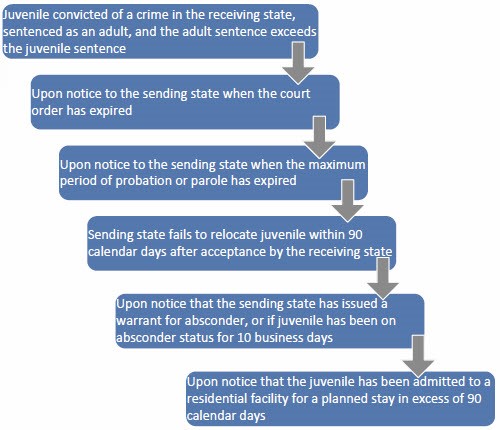Closing a Case
Only the sending state has the authority to discharge/terminate supervision of its juveniles. This provision does not prohibit a receiving state from filing and prosecuting new charges against an out-of-state juvenile who has committed a new offense. It merely states the obvious: jurisdiction over a case (and therefore a juvenile) remains with the state court where the charges forming the basis for supervision were adjudicated or prosecuted.
However, the receiving state is not required to continue providing supervision in all cases. As noted earlier, there is a distinction between the concept of jurisdiction (which is fixed in a particular court) and supervision (which can be transferred to another state). A receiving state can close a case under the following circumstances:
- When a juvenile is convicted of a crime and sentenced under the jurisdiction of the adult court of the receiving state and the adult sentence issued by that court is longer than the juvenile sentence, the receiving state may close the supervision and administration of the case once it has notified the sending state in writing and provided it with a copy of the adult court order. ICJ Rule 5-104(1)(a) (Interstate Comm’n for Juveniles 2024).
- Upon notice to the sending state, when the court order that formed the basis of supervision expires. Id. at Rule 5-104(1)(b).
- When a sending state fails to relocate a juvenile within ninety (90) days after acceptance by the receiving state unless a request for extension has been made and an appropriate explanation provided. Id. at Rule 5-104(2).
- Upon notification that a warrant has been issued by the sending state for a juvenile who has absconded from supervision in the receiving state, or if the juvenile has been on absconder status for ten (10) business days. Id. at Rule 5-104(4).
- The receiving state may close the supervision case upon notification that the juvenile has been admitted to a residential facility for a planned stay in excess of ninety (90) calendar days. Upon release from the facility, if the juvenile remains on supervision within the sending state and meets eligibility requirements, the sending state shall submit a new referral.

Additionally, a receiving state may submit a request for early release to a sending state articulating the grounds for the request. The sending state must be provided an opportunity to consider the matter, to advise the court of jurisdiction or state agency of the request, and to make known any objection or concern before the case is closed. The decision to release a juvenile from supervision early rests in the exclusive authority of the sending state. If early release is denied, the sending state provides to the receiving state an explanation within sixty (60) calendar days as to why the juvenile cannot be released from probation/parole. Id. at Rule 5-104(3).
